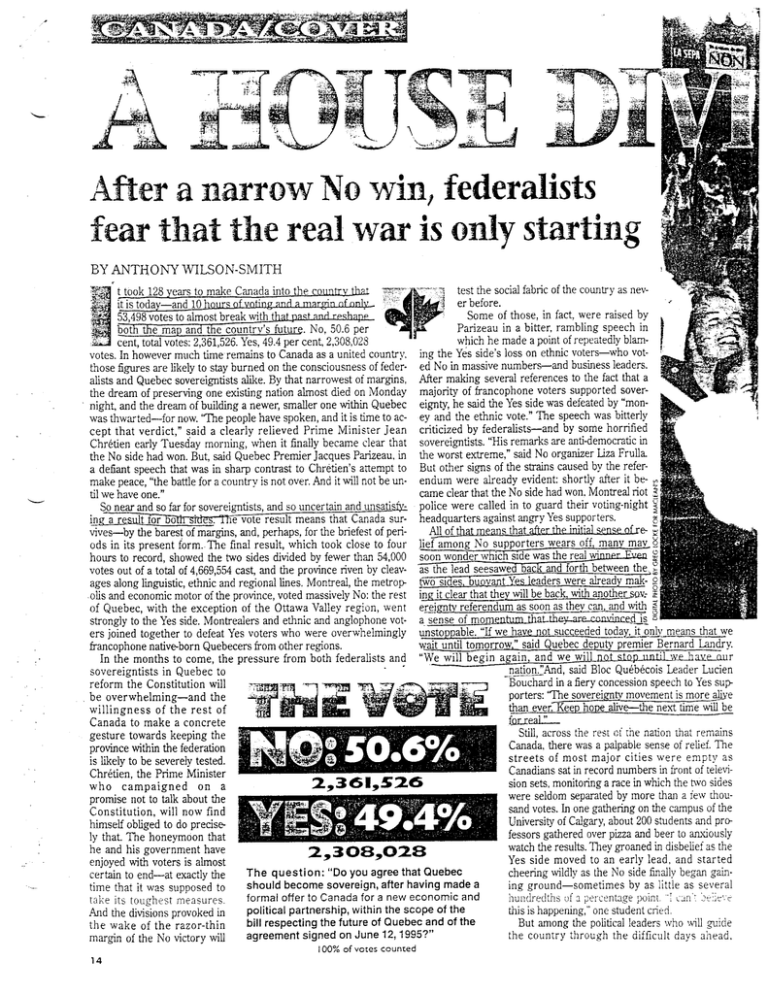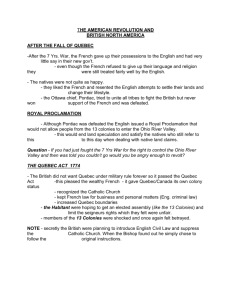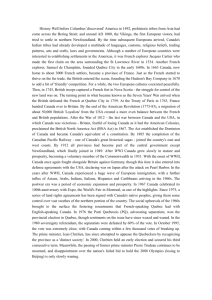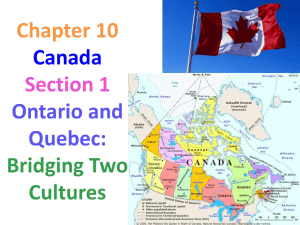that win, After starting
advertisement

After a {aaruGqv No win, federalists
fear that the real war is only starting
BY ANTH OI.{Y
\\'iISO N-SMITH
t tbok 128 years to make Canada into the country that
it is today-and 10 horrrs of voting and a margin nf.nnl]'
53,498 votes to ahost break *ith thut p"*t ,.
Biifi'TEfr ap-E-ilTEFcou n t rv's tu tu re. N o. 50. 6 per
cent, total votes: 2,361,526. Yes, 49.4 per cenl 2,308,028
votes. In however much time remains to Canada as a united countrJ',
those figures are likely to stay burned on the consciousness offeder'
alists and Quebec sovereigntists alike. By that narrowest of margins,
the dream of preserving one existing nation almost died on Monday
night, and the dream of building a newer, smaller one within Quebec
was thwarted-for now. 'The people have spoken, and it is time to accept that verdict," said a clearly relieved Prime Minister Jean
Chretien early Tuesday moruing, when it finaily became clear that
the No side had won. But, said Quebec Premier Jacques Parizeau, in
a defiant speech that was in sharp contrast to Chretien's attempt to
make peace, "the battle for a country is not over. And it will not be until we have one."
and
near and so far for sovereigntists, .!4-!9f
test the social fabric ofthe country as never before.
Some of those, in fact, were raised by
Panzeau in a bitter, rambling speech in
which he made a point of repeatediy blaming the Yes side's loss on ethnic voters-who voted No in massive numbers-and business leaders.
After making severai references to the fact that a
majorily of francophone voters supported sovereignty, he said the Yes side was defeated by "money and the ethnic vote." The speech was bitterly
criticized by federaiists-and by some horrified
sovereigntists. "His remarks are anti-democratic in
the worst extreme," said No organizer Liza FrullaBut other signs of the strains caused by the referendum were already evident: shortly atter it became clear that the No side had won. tllontreal riot
=
police were called in to g'uard their voting-night
c
vives-by the
ods in its present form..The Iinal result, which took close to four
hours to record, showed the two sides divided by fewer than 54,000
votes out of a total of 4,669,554 cast, and the province riven by cleavages along linguistic, ethnic and regional lines. Montreal, the metrop
olis and economic motor of the province, voted massively No: the rest
of Quebec, with the exception of the Oftawa Valley region, w'ent
strongly to the Yes side. Montrealers and ethnic and anglophone voters joined together to defeat Yes voters who were overwhelmingly
francophone nativeborn Quebecers from other regions.
In the months to come, the pressure from both federalsts and
sovereigntists in Quebec to
reform the Constitution will
be overwhelming-and the
willingness of the rest of
Canada to make a concrete
gesture towards keeping the
province within the federation
is likely to be severely tested.
Chretien, the Prime Minister
who campaigned on
a
promise not to taik about the
Constitution, will now find
himself obliged to do precise
ly that. The honeymoon that
he and his government have
enjoyed with voters is alrnost
cerlain to end-at exactly the
time that it was supposed to
take its toughest measures.
And the divisions provoked in
the wake of the razor-thin
margin of the No victory will
O
n the
g
o
o
E
witil
0
"We wi
ffffiHW#tr#
ion And, said Bloc Quebecois Leader Lucien
Bouchard in a fiery concession speech to Yes sup
rg-nty movemenl tS more att
Stili, across the resr r;f tire nation ihat remahs
Canada, there was a palpable sense of relef. The
streets of most major cities were empty
2r3611526
2r3o8ro2,et
The question: "Do you agree that Quebec
should become sovereign, after having made a
formal offer to Canada for a new economic and
political partnership, within the scoPe of the
bill respecting the future of Quebec and of the
agreement signed on June 12,1995?"
I
14
s
soon
00% of votes counted
as
Canadians sat in record numbers in iront of television sets, monitorilg a race in which the trvo sides
were seldom separated by more lhan a ierv thousand votes. In one gathering on the campus of the
University of Calgary, about 200 shrdents and pro
fessors gathered over pizza nd beer to arxiously
watch the results. They groaned in disbeiief as the
Yes side moved to an early lead, and started
cheering wildly as the No side fina1lv began gaining ground-sometimes by as little as several
irunCleclths Lrf r p'ercentrge point. 'l r:in i ll':'. c
"f
this is happening," one sfudent crieC.
But among the political leaders ',r'ho ',vill guide
the country through the diificult da-vs aliead.
bgi''
'.lirt1
+
r11--
&
e
{.
r
n
'rher-ewgla-EeSLawarenes-e[halthe
vrfid-le&d@d+
rhan-areal-:dc:final-resu]r-ir6q1e like a rePrieve
o t-
D lerp-Le't-th
sge_real_ebange.-r-nerers.no-a'.r,5-iiir,
ihe
fE;j;j_dq!_.qg
fnfill@-s[t'aue t9-SraRlle uiiqh
months to come, the final resuit
other premiers. rn the
"3f,fft;i,Tft"#Hi*d
toi ainogt ail the kev figures in the rel'erenquesnon.;;ilil*;is
raises far more
u1!,e1.1:-:::ltJi
Cunuaiunt
ls'w!,icn
s.t
dum-and, in the long
present
llandale, \ ]u
its
ln
plebiscite
"?t"','itit"n
hold another
S
e
r.l.*nor
Quebec,s Referenclum
probabi-u- seek a reason ,o
S
earliest op-
go*b;; io-tir. pollr in i provinciai election at the
;; l:! *'
po r tunity P arize au,. wh o'i;p
:...
:;i;,]1. 3 :li:i1'.t
step oow.111 tl
may.
i^.t.1.^a.r of the Yes canpaign.
said he
once
Bouchard
although
In ihe meantime'
s
ic Bloc leader to take iti' i'f t?t'
ti Clttont in the event of a No win' there appeat
fit""
tftt
i"
seat
his
leave
would
1-
S
le
)
.l
a neasure of relief
abdlrtlo_b9-c'q=nqryE4ns\\]cKrremler.d-itH,iffi
e,t! tllt-Pl
I
e
0eil:
lgrv-ue!1yeyg"i{:4i,+i=flr:i::#;:t?l'ff;:*#i'###fi1&*
e
Y
Leader Daniel Johnson
No supporters; Quebec Liberat
#'; ;
:;;
i'ffi
ig titU.
" iit .tlttood that he will do that'
i; th. short term,.in #;i#"**'il-:'l:l,tii:,T:i!:'i;;il'."};J:t?''"|j:.f1,l
rrcconlpanleo Dy
!
ner, Chreden. Visibiy ed9" anci
ipacedfomroomto,oo*-u|ni,iesicienceat2.}sussexDriveinO|krvaastheresu}ts
it'"] 't' L'::li-liJ''';il ';j:lt :i""tr-elgrtist :ice thrt he lllls
I triciilrrl ln. On :i 'r...'-',,,',
Aliericli" botn '"vithin
iht
biorv'
,p.nr mosi oi Ine paslO t t"f igltrlg 'l^tt::1'j:tt"t
he is brint seconrl-(uessed
counlrr'.
[ite
':
lcross
cir.le"
3 Liberal cituclrs and rn poliiicrl
sti-ength. The iederal
sovereigntisr
E and criticiz.a ro, ,.r,.i.ii""a.r.t,haring
!
!\ACiEAN'S/NOVEI'/SER
o,
I
995
t5
Uberals vrere so confident of victory that they did not even
consider how they would react to a loss until the campaign-was already under wuy. Euen as the Yes side began pulling even in *re polls
two weeks ago, complained one insider, "there was no Plan B'"
Now, they find thiir credibility undermined at precisely the Lime
that they nled it mosl Plans for the 199G1997 federal budget, in
which Finance Minister Paul Martin pians to cut billions in spending, are already behind schedule, and the narrow margin of the No
vidiory could put Otlawa's entire fiscal agend-a at risk' There are
worse"fights ahead. Over the next two years, Ottawa will cut about
one-third from the $t0.8 biilon in cash that it bansfers annually to
the provinces {or health, social assistance and postsecondary education. On April 1, 1997, the current formula to divide that cash lapses'
That means that over the next 18 months, and in spite of the frac'
of Quebec's "distinct society." That, in facl may be an easler task than it appears at first glance. The recognition of Quebec as a
distinct sociefy, a cornerstone of the province's demands, is less confoversial than many Cariadians realize: the Supreme Court of Canada
has aireaciy recognized Quebec's distinct character in its interpretation of the Chirter of Rights and Freedoms. Under the Constitution
Act of 1982, an amendment that recognizes Quebec's stahrs as a distinct society would require the consent of Ottawa and any seven
orovinces with 50 per cent of the population. The very wording of that
amendment would be contentious because provincial leaders will want
to limit the scope of its application. But most legislatures would likely
pass it-if oniy because they have been so b-aumatized by Canada's
ciose call.
Other proposed changes are likely to be less contentious, but no
'We witt not stop wntil we have our rtstiort'
iess important. Constitutional change, said
McKenna, "is important,
but adminisfative change
is perhaps as importanl'
That means that such dry
but important topics as
control over manpower
training are likeiy to rise
to the top of any agenda
for change. Aiready, last
sumrner, the federal gov-
ernment considered
a
plan to ky to short-circuit
sovereigntist stength be
fore the referendum by
E
defeat on the ethnic vote'
Bouchard with wile Audrey Best; Parize:au |ight): the bifter premiet blaned his
tious aftnosphere that seems likeiy, Ottawa and th9 provinces must
devise a new formula to divide that dwindling total. The situation is
volatile because the current formula penalizes the richer provinces
of Ontario, Britjsh Columbia and Alberta. Those richer province;
simph wilt not tolerate a continuation of the current system, which
no* giues them less money per resident than the other seven
p.ouiices. But the PQ is certain to exploit any attempt to reduce the
amount that Quebec now receives.
Those are longer-term headaches. ln the short term, one of the first
effects of the narrowness of the victory was that the Prime Minister
was reconsidering plans to leave for a 17day tip to the Asia-Pacifc re
gion. That t'ip, diiigned to stimulate invesknent, was also supposed
io emphasize the government's business.asusuai approach to governing the counry in Ue rmke of the vote. lnstead, it only higtrlights the
iu& Ut"t the business of governing the county is about to become
any4hing but usual.
Aft"t-P.ir".u's argument that Quebecers should vote for sovereignty ia order to prelerue social programs, the Jederal government
*iU iice enormous pressure to shelve plans to reform and reduce unemployment insurance--one of its keys to deficit reduction: Human
n".oui..t Minister Uoyd Axworthy had planned to shave at least
government
$t.6 biltion from the present $t3.2-bilion total rat the
crrrently spends on unemployment insurance. Similarly, plans !o in-o""r. tit" qualifying age for otd-.ge pensions and reduce the size of
benefits for weal-thier iecipients may also be shelved. Without such
measures, it wiil be almosfimpossible for Martin to achieve his deficit
reduction targets.
But in the iattle to keep the counfy together, even those plans pale
ir signiicance aiongside-tLre need to suddenly come up with new and
subJantiue p.opo."ls to reform the way that Canada is governed in a
manner tlat witt appeal to all Canadians. Just as Pierre Trudeau committed himseLf to a promise of constihrtional reform near the end of
the 1980 referendum in a manner that still reverberates 15 years later,
Chretien is now bound to live up to his promise to support recognition
l6
offering the provinces exclusive conhol over mal-
power training. But the
MPs from Atiantic
Liberal
from
opposition
by
olan was scuftled
orovinces who felt that their provinces lacked the resources to run
iuch prosrams properiy. But now, the federal government seems
."it"i" to"t..*ict the issue. Similarly, Chretien is likely to accord
chaired by
amuch greater urgency
-stud-y -group
who
is looking at
Mass6,
Marcel
Minister
Affairs
ini"rnoui*-ental
to
ieduce duplication of services between Ottawa and the
govo.ouin..r. some action on Nlass6's recommendations, a senior
'"in n"nt adviser said late last week, "would be most desirable in a
;;yJ;
of months, not Years."
matter
'-',A*otrr".
.ontentious-issue, the restoration and formal recognition of
qr"t*b t-aditional right to a constihrtional veto, is )ike! to take longer,
promise'
and face more intense opposition. ln another latecampaign
in a
be
amended
to
Constih:tion
the
allow
never
would
Cf,t"tl.n said he
*"uld affect Quebec without the province's consent while
Minister-but he stopped short of offering the province a
ii. ir
the
i""rJ ;ei,t of veto. That mater is likely to wait until 1997, when
a
to
hold
Constitution
the
of
the
terms
by
required
tld"i.ter is
meeting on constitutional reform with the premiers'
compelling and immediate challenge for Chretien will
Quebecers to believe in each other and
lie
mass displays of affection towards
The
again.
their shared country
lvere seerl with enthusiasm
t]t" final aays of the campaign
*Whv
do
thev wait until we threaten
manv.
bv
b;-;;;;, *a suspicion
young
francophone wornan
a
asked
us?"
like
they
us
io
teil
t,i f.t".
And' said
in
Montreal'
rally
No
mass
*fr" *"t.f,.J last week's
Beaudoin after
l'ouise
Minister
Affairs
lntergovernmental
Quebec
d. forr,;Engish-Canadians have talked a lot about how muchnotthey
be
fik; ;t. Now,-it's time to do more than talk'" Otherwise, it wiil
the
fonn U"io.. the counfy finds itself da-ncing one last time towards
of tn. constifutional abvss, unable or unu'i11ing to turn back'
;;;;th"t
ni-.
ni-.
"'iil;;;;
i";^.hit; C-iai*J-a
q".h;i
"Jn-.
With MARYJANIGAN ia Toronto, MARY NEMETH in Calgary, JOHN
DeMONT in Halifot and E' KAYE FWTON in Ottawa
QUESTIONS
1. What was the margin by which the NO side won?
2. Which parts of the Province voted yes, voted No? Why?
3. Who did Parizeau blame the loss on?
4. Why did Chretien say that war
is
just beginning?
5. How does the Quebec issue affect Canada's budget cuts?
6. What did some Quebeckers have to say about English Canadian
affection towards them before the vote.?
![Garneau english[2]](http://s3.studylib.net/store/data/009055680_1-3b43eff1d74ac67cb0b4b7fdc09def98-300x300.png)




